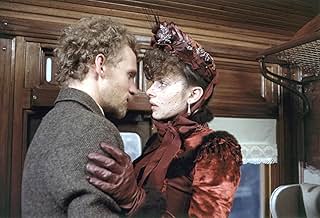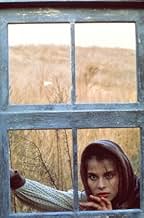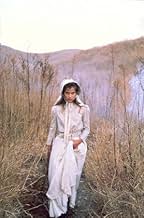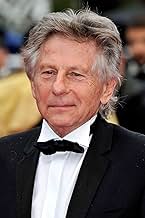AVALIAÇÃO DA IMDb
7,3/10
19 mil
SUA AVALIAÇÃO
Uma jovem camponesa com um caráter forte atrai o afeto de dois homens.Uma jovem camponesa com um caráter forte atrai o afeto de dois homens.Uma jovem camponesa com um caráter forte atrai o afeto de dois homens.
- Direção
- Roteiristas
- Artistas
- Ganhou 3 Oscars
- 16 vitórias e 17 indicações no total
Nastassja Kinski
- Tess
- (as Nastassia Kinski)
Avaliações em destaque
In this adaptation of the Hardy novel, a peasant girl who may be descended from a noble family encounters romance and tragedy in 19th century England. Meticulously directed by Polanski, this epic drama unfolds quite leisurely but does not drag. The English countryside is beautifully captured, with the cinematography adding a haunting quality to the barren landscape, an effect further enhanced by the evocative score. Perhaps she does not faithfully embody the strong-willed heroine of the novel, but Kinski (resembling a young Ingrid Bergman) looks exquisite and effectively conveys a sense of melancholy in a star-making performance.
This film was an almost exact replication of Thomas Hardy's novel "Tess of the d'Urbervilles". It's so rare to watch a film after reading the novel and not be disappointed by it, but this film didn't disappoint in any way.
Details, such as the whiteness of the maids' dresses, the sound of milk squirting into a bucket, the sloshing mud of a wet English turnip field, and the glint of adoration in the eyes of the young lovers -- all came gloriously to life as if fresh off the pages of the book.
I highly recommend this film for anyone who enjoys a good old fashioned Victorian love story.
Details, such as the whiteness of the maids' dresses, the sound of milk squirting into a bucket, the sloshing mud of a wet English turnip field, and the glint of adoration in the eyes of the young lovers -- all came gloriously to life as if fresh off the pages of the book.
I highly recommend this film for anyone who enjoys a good old fashioned Victorian love story.
SYNOPSIS A poor girl in late 1800s England is used and abused in her search for love, affection and devotion.
CONCEPT IN RELATION TO THE VIEWER True love is an allusive thing and the rules and morals of an upper class society makes some men into real jerks. Sometimes following your heart can be a difficult road with a lot of dead ends and pitfalls.
PROS AND CONS I watched this film back in college when it first came out. I was a fan of Roman Polanski's work and this was his first film after 'Chinatown', which is one of my all time favorites. I recall that this was a long (almost 3 hours) film that was very slow and beautifully shot. Since I was more interested in car chases and explosion in my youth, I didn't recall this as being a very good film.
Since age tempers a lot of our youthful interests, the second viewing of this film was a much different experience. This is a slow film but it has to be. Life was much methodical and personal in the rural countryside of Victorian England. The script and acting are very intimate and you really get to know the characters as the story unfolds on the screen. The subtle tone of this film is amazing and the level of detail actually makes you believe you are in 1890s England.
The two lead characters played by Nastassja Kinski (Tess) and Peter Firth (Angel) do an exceptional job. Kinski's character is extremely shy and withdrawn. Firth is also engaging in his subtle portrayal of a preachers son trying to find the meaning of life. It is obvious from watching the film that Polanski was infatuated with Nastassja Kinski. He lingers on her in many shots and for good reason. She portrays the perfect heroine, virginal, pure and very beautiful.
The cinematography in this film is even more beautiful the second time around. The surreal scene of a fox hunt emerging from the mist in front of Tess as she walks down a deserted country road is mesmerizing on several levels. The end scene at Stonehenge with the rising sun casting long shadows as the final credits roll is truly breathtaking. There are countless other scenes like this that give the film and almost dreamlike quality.
In the end the viewer feel sorry for Tess as she is led away. She is more a victim of circumstance and the callousness of others than of her own doing. But the world of rural Victorian England was not a nice place, especially if you were poor, naive and very beautiful.
CONCEPT IN RELATION TO THE VIEWER True love is an allusive thing and the rules and morals of an upper class society makes some men into real jerks. Sometimes following your heart can be a difficult road with a lot of dead ends and pitfalls.
PROS AND CONS I watched this film back in college when it first came out. I was a fan of Roman Polanski's work and this was his first film after 'Chinatown', which is one of my all time favorites. I recall that this was a long (almost 3 hours) film that was very slow and beautifully shot. Since I was more interested in car chases and explosion in my youth, I didn't recall this as being a very good film.
Since age tempers a lot of our youthful interests, the second viewing of this film was a much different experience. This is a slow film but it has to be. Life was much methodical and personal in the rural countryside of Victorian England. The script and acting are very intimate and you really get to know the characters as the story unfolds on the screen. The subtle tone of this film is amazing and the level of detail actually makes you believe you are in 1890s England.
The two lead characters played by Nastassja Kinski (Tess) and Peter Firth (Angel) do an exceptional job. Kinski's character is extremely shy and withdrawn. Firth is also engaging in his subtle portrayal of a preachers son trying to find the meaning of life. It is obvious from watching the film that Polanski was infatuated with Nastassja Kinski. He lingers on her in many shots and for good reason. She portrays the perfect heroine, virginal, pure and very beautiful.
The cinematography in this film is even more beautiful the second time around. The surreal scene of a fox hunt emerging from the mist in front of Tess as she walks down a deserted country road is mesmerizing on several levels. The end scene at Stonehenge with the rising sun casting long shadows as the final credits roll is truly breathtaking. There are countless other scenes like this that give the film and almost dreamlike quality.
In the end the viewer feel sorry for Tess as she is led away. She is more a victim of circumstance and the callousness of others than of her own doing. But the world of rural Victorian England was not a nice place, especially if you were poor, naive and very beautiful.
Tess had a lot going for it, a wonderful book and a director that was responsible for masterpieces like Chinatown, Repulsion and Rosemary's Baby. Tess didn't quite live up to the promising potential it did have and I don't consider it one of Polanski's masterpieces. However it is a commendable film and adaptation(even if I do prefer the 2008 BBC series) and better on re-watch than when I saw it a couple of years back and didn't care at all for it. The film is overlong, and while the pace is purposeful considering the book's complexity there are times where it does get a bit too languid. On the other hand, visually it is stunning with evocative scenery and photography. The music is also resolutely haunting, the scripting thought-provoking and literate and the story having its necessary pathos as well as being devastating and powerful in equal measure. The denouncement with Stonehenge as the backdrop is just stunning. The characters are not as complex as in the book or the series but are still interesting and emphatic. Nastassja Kinski does have moments where she is a little flat, but on the whole it is a very moving performance. Peter Firth is suitably subtle as Angel Clare and Leigh Lawson's menacing Alec comes close to stealing the film. Polanski's direction is exemplary. All in all, has much to admire but falls flat of being a truly outstanding movie. 7/10 Bethany Cox
Beautiful to look at, not just the scenery but the art direction as well but overlong and somewhat ponderous. Nastassja Kinski handles the complex lead role with surety and exudes a great deal of charisma and star quality, it's surprising that her career fizzled out so completely but as she matured those qualities in evidence here diminished. Director Polanski's silent tribute to his late wife Sharon Tate at the end of the opening credits with a simple "To Sharon" after his credit is quite moving. She had left the Hardy novel with a note that she thought he would make a fine film of it when she headed back to the states just before her death.
Você sabia?
- CuriosidadesThe film's opening dedication at the start of the film states: "For Sharon". Roman Polanski dedicated this movie to his late wife, Sharon Tate, who was killed in 1969 by the Manson Clan. Before Tate's death, she had read the film's source novel by Thomas Hardy and was convinced that her husband would one day make a great film based on the novel, with the hope that she would star in it. Movie was released to the theaters exactly 10 years after her untimely death.
- Erros de gravaçãoAt the beginning of the final sequence, set at Stonehenge, someone's head can be seen at bottom-left.
- Versões alternativasThe film was first released to German cinemas uncut with a running time of 184 minutes. As the audience reaction was far from overwhelming the distributor decided to re-cut and re-release the film in a more "accessible" 134 minutes version. But at least one of the original prints had survived and was shown here at the local art house years later.
- ConexõesFeatured in The 38th Annual Golden Globe Awards (1981)
Principais escolhas
Faça login para avaliar e ver a lista de recomendações personalizadas
- How long is Tess?Fornecido pela Alexa
Detalhes
Bilheteria
- Orçamento
- US$ 12.000.000 (estimativa)
- Faturamento bruto nos EUA e Canadá
- US$ 20.093.330
- Faturamento bruto mundial
- US$ 20.101.247
- Tempo de duração3 horas 6 minutos
- Cor
- Proporção
- 2.35 : 1
Contribua para esta página
Sugerir uma alteração ou adicionar conteúdo ausente

Principal brecha
By what name was Tess - Uma Lição de Vida (1979) officially released in India in Hindi?
Responda

































